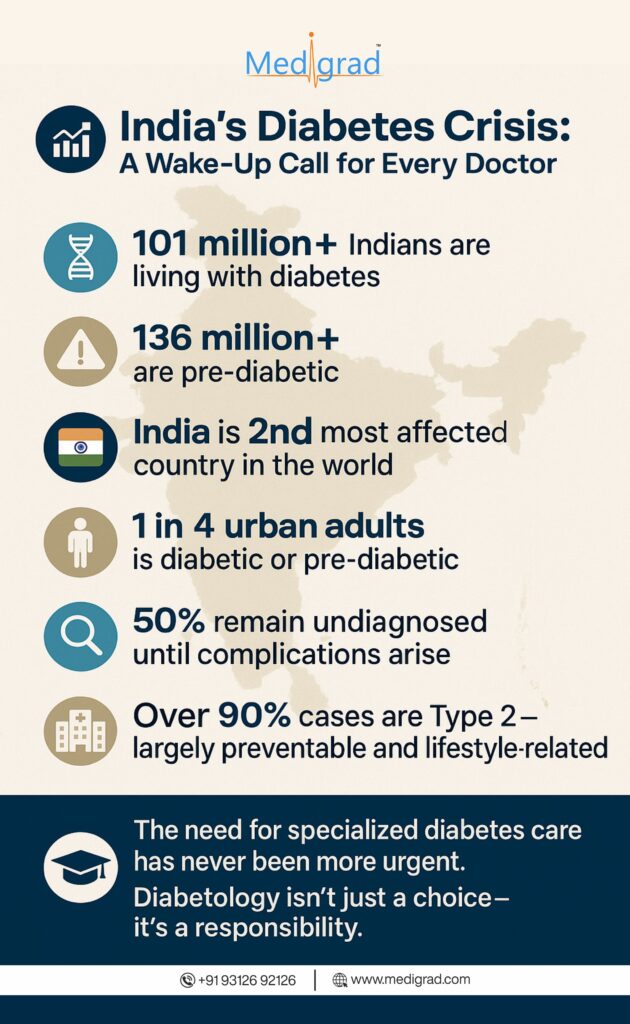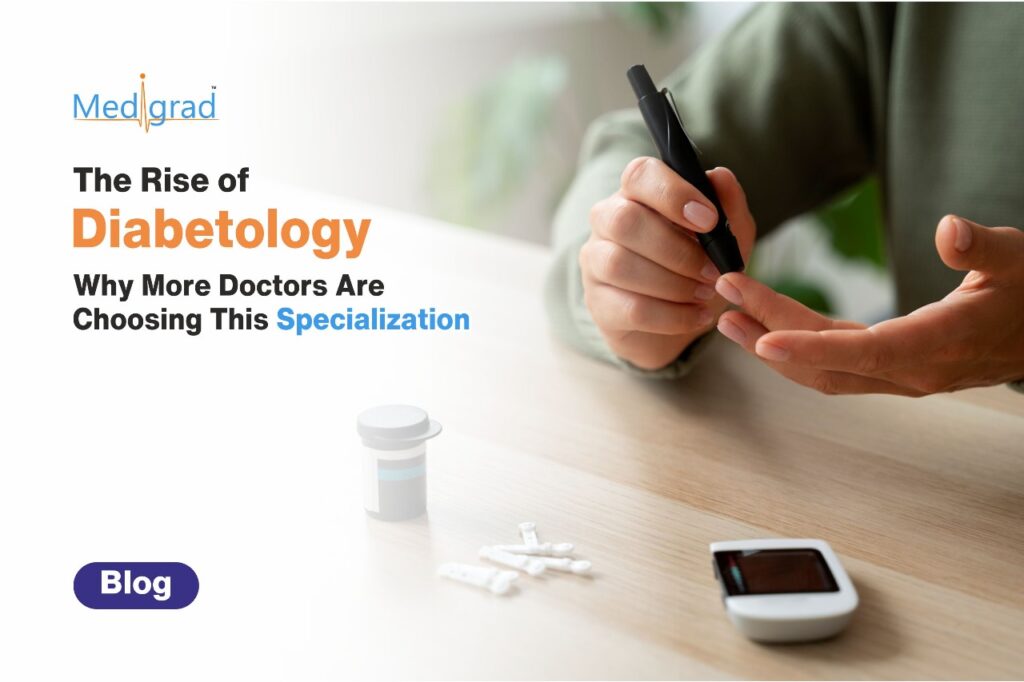In the world of medicine, specialization is more than a trend—it’s a necessity. And among the many emerging and essential fields, Fellowship in Diabetology is witnessing a significant surge in interest. Today, more and more doctors—especially those searching for relevant courses for doctors, or exploring fellowship after MBBS—are gravitating toward this impactful and rewarding specialization.
But what exactly is driving this rise in Diabetology? And why is a Fellowship in Diabetology becoming a preferred choice among post-MBBS career options?
Let’s explore.
Why Diabetology Is on the Rise
1. A National Epidemic in the Making
India is often referred to as the diabetes capital of the world, with over 100 million people currently living with diabetes, and millions more in the pre-diabetic stage. For general physicians and family doctors, diabetes is no longer a side note—it’s often the main concern.
This growing burden has created an urgent need for trained professionals in diabetes management, fueling the demand for fellowship in diabetes after MBBS and other courses in diabetology.
2. Changing Patient Expectations
Today’s patients are more aware, more proactive, and expect precise, long-term diabetes management. They’re not just looking for sugar control—they want lifestyle guidance, prevention strategies, and ongoing care.
For doctors, this means it’s no longer enough to offer a prescription. Specializing through a post MBBS fellowship course like Fellowship in Diabetology allows you to meet this growing demand with competence and confidence.
3. Flexibility in Learning with Online Diabetes Courses
One of the biggest reasons for the popularity of this specialization is accessibility. With the advent of online diabetes courses and remote fellowship courses after MBBS, doctors no longer have to relocate or pause their practice to upskill.
These post MBBS courses are designed with working professionals in mind—offering self-paced modules, case-based learning, and mentorship from experienced specialists.
So, if you’ve been wondering after MBBS which course is best to both upskill and stay in practice—this might be your answer.
Why Doctors Are Opting for a Fellowship in Diabetology
1. Immediate Clinical Relevance
Unlike broad MD programs that take 2-3 years, a fellowship post MBBS in Diabetology focuses specifically on diagnosing, treating, and managing diabetes and its complications. What you learn today can be applied in your clinic tomorrow.
This practical, hands-on approach makes the fellowship in diabetology incredibly rewarding for general practitioners, internal medicine doctors, and even family medicine practitioners looking to expand their scope.
2. More Than Just Blood Sugar
Diabetology isn’t just about prescribing insulin or metformin. It covers complications like nephropathy, neuropathy, retinopathy, diabetic foot, and cardiovascular issues—making it a comprehensive specialty in itself.
Doctors completing a fellowship in diabetes after MBBS are often seen as trusted long-term advisors for their patients—helping with diet, lifestyle, medication, and mental well-being. That’s why it’s not just a medical decision, but a human one.
3. Career Growth and Practice Expansion
Whether you’re in a busy urban clinic or a solo rural setup, adding a diabetology specialization can attract a whole new patient segment. Many doctors find that after completing their post MBBS course, they can start diabetes-focused clinics or expand into preventive health.
With the increasing focus on NCDs (non-communicable diseases), having a fellowship in diabetology makes you a key player in the future of healthcare.
Who Should Consider a Fellowship in Diabetology?
- General Physicians who want to go beyond basic diabetes treatment
- Family Doctors who regularly manage chronic conditions
- Young MBBS Graduates who are exploring after MBBS courses but don’t want to pause clinical work
- Doctors in Tier 2 and 3 Cities looking to bring advanced diabetes care to underserved areas
Other High-Demand Specializations Doctors Are Pairing With Diabetology
While Diabetology stands strong on its own, many doctors also pursue other fellowship courses after MBBS to complement their practice:
- Fellowship in Emergency Medicine – For handling acute diabetic complications
- Fellowship in Family Medicine – For holistic, primary-care based diabetes management
- Fellowship in Internal Medicine – Ideal for managing multi-systemic impacts of diabetes in adult patients
- Fellowship in Infectious Disease – Especially important given diabetic patients’ higher infection risk
- Fellowship in Pediatrics – For doctors focusing on childhood and adolescent diabetes
- Fellowship in Echocardiography – Given the strong heart-diabetes link
Each of these courses for doctors adds value to your profile and helps build a truly integrated practice.
Why Online Makes Sense for Busy Doctors
Let’s face it—traditional MD/MS programs aren’t for everyone. They require years of study, relocation, and a complete pause on earnings. That’s why online fellowship courses have emerged as the go-to option for upskilling.
Today, a fellowship post MBBS in Diabetology (or related fields) allows you to:
- Study at your own pace
- Access expert faculty without city limits
- Keep earning while you learn
- Get practical, patient-focused training
- Finish your course within 12 months or less
For thousands of doctors, this format makes professional growth possible—even joyful.
Final Thoughts: Is Diabetology the Right Path for You?
If you’re someone who:
✅ Enjoys managing long-term patient relationships
✅ Wants to offer more value in your current practice
✅ Seeks flexible, credible upskilling options
✅ Feels ready to make a bigger impact in your community
…then a fellowship in Diabetology may just be the best course after MBBS for you.
With India’s diabetes burden showing no signs of slowing down, the future for diabetologists is promising, fulfilling, and impactful.
So, the next time someone asks, “After MBBS which course is best?”—you’ll know there’s more than one right answer. But if you’re looking for a specialization that’s high in demand, rich in patient impact, and easily accessible through online learning—Diabetology is rising for a reason.


